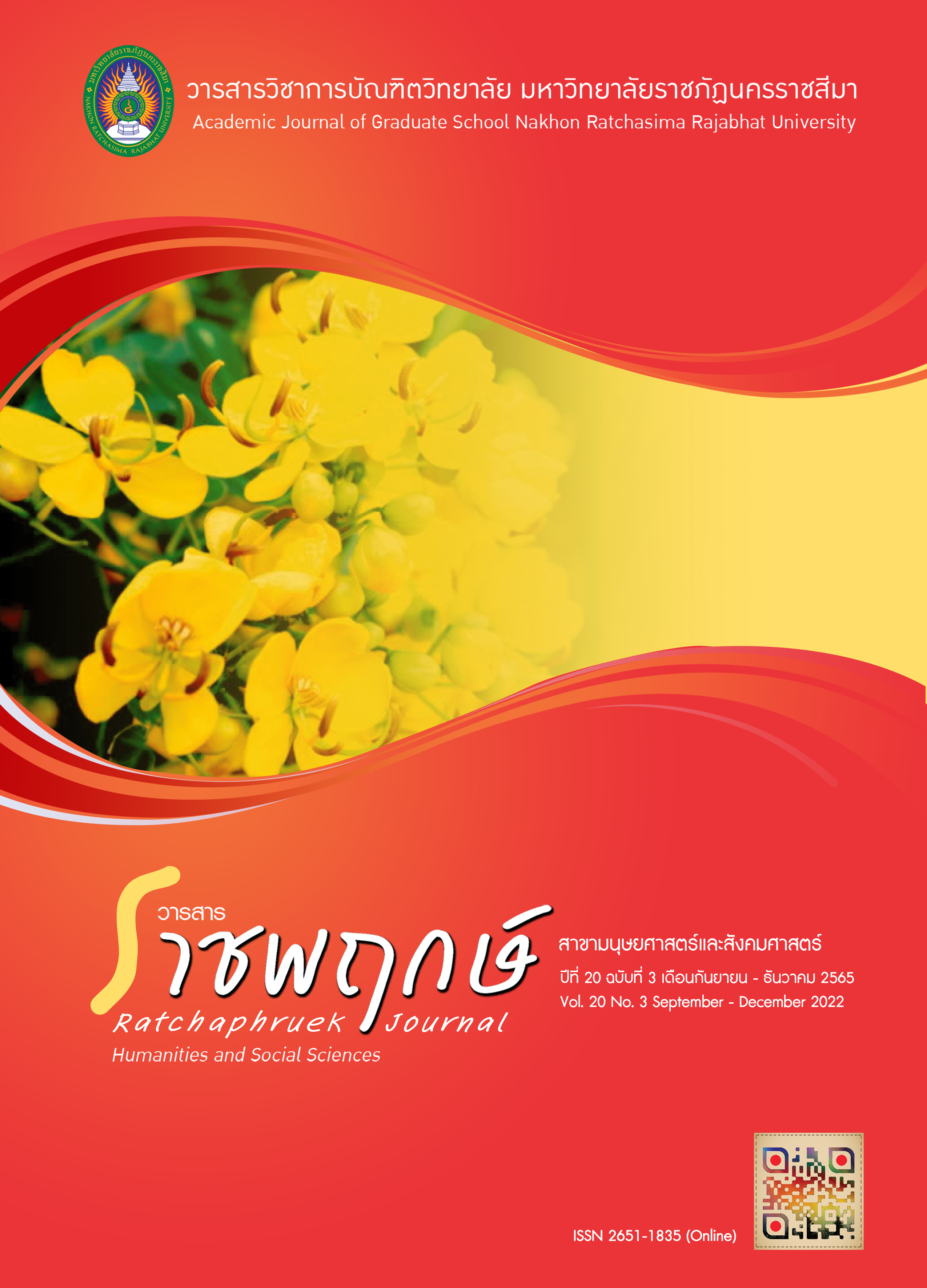The Impact of Learning-Experience Activities Based on Trisikkha Principle and EF Guideline on Preschoolers’ Self-Regulation Skills
Main Article Content
Abstract
The purpose of this research was to evaluate the impact of the learning-experience activities based on the Trisikkha principle and the EF Guideline on preschoolers' self-regulation (SR). The research design was quasi-experimental, pretest-posttest research. The population was 75 preschoolers aged 3 to 6 years old studying in the third semester, the academic year 2020 where the preschool teachers created the activities and environment based on the Trisikkha principle and the EF Guideline. The instruments for promoting the SR included 1) EF Guideline; a tool for guiding the teachers to create the activities and environment to promote the children's EF skills, 2) a tool for assessing the quality of the learning-experience activities, and 3) learning-experience activity plans. Moreover, the instruments for assessing the children’s SR skills included 1) the assessment of Executive Function in Early Childhood (MU-EF 101) and 2) the SR behaviour checklist. A paired sample t-test was utilized to investigate the changes in the preschoolers' pretest and post-test mean scores on self-regulation skills. There were significant differences between the pretest and posttest mean scores on the MU-EF.101 related to SR skills (p < .05). The preschoolers significantly had the higher post-test mean scores on all components of the SR skills compared with their pretest. The results showed that most preschoolers were rated their school performance based on the SR skills as excellent in all four aspects at the end of the semester. The results indicated that the learning experience positively impacted the preschoolers' SR skills.
Article Details

This work is licensed under a Creative Commons Attribution-NonCommercial-NoDerivatives 4.0 International License.
References
พิริยะ โม้แพง. (2558). การพัฒนาหลักสูตรฝึกอบรมคุณธรรมจริยธรรมโดยใช้ไตรสิกขาเป็นฐาน สำหรับนักเรียนชั้นประถมศึกษาปีที่ 5. วารสารวิชาการศึกษาศาสตร์ ศรีนครินทรวิโรฒ, 15(2), น. 1-12. สืบค้นเมื่อ 2 มีนาคม 2562, จาก http://ejournals.swu.ac.th/index.php/Jeju/article/view/ 6645
พระครูปิยกิจบัณฑิต (กรกิจ, ปิยธมฺโม), วรกฤต เถื่อนช้าง, วินัย ทองมั่น และอานนท์ เมธีวรฉัตร. (2563). รูปแบบการบริหารจัดการศึกษาตามหลักไตรสิกขาของโรงเรียนวิถีพุทธในจังหวัดสุโขทัย. วารสารบัณฑิตศึกษาปริทรรศน์ วิทยาลัยสงฆ์นครสวรรค์ 8(2), น. 1-14. สืบค้นเมื่อ 2 มีนาคม 2562, จาก https://so02.tci-thaijo.org/index.php/jgsnsbc-journal/article/view/244617/165814
ปรเมธ ศรีภิญโญ. (2562). หลักไตรสิกขากับการสอนในโรงเรียนวิถีพุทธ. วารสารพุทธปรัชญาวิวัฒน์, 3(1), น. 27-41. สืบค้นเมื่อ 2 มีนาคม 2562, จาก http://202.29.86.169/index.php/jbpe/article/view/869/687
Arsan, C., Seree, P. & Thanasetkorn, P. (2018). The impact of learning experiences based on EF Guideline on children’s executive function skills: A case study of a school in Tak province, INTED2018 Proceedings, pp. 5780-5786.
Center on the Developing Child at Harvard University. (2015). Executive Function & Self-Regulation. Retrieved March 17,2020, from https://developingchild.
harvard.edu/science/key-concepts/executive-function/
Imtaku, P., Seree, P. & Thanasetkorn, P. (2018). The effect of the Executive Function Guideline for writing learning experience plans on the preschool teachers’ teaching skills: A case study of the kindergarten in Bangkok, INTED2018 Proceedings, pp. 9531-9536.
Keown, L. J., Franke, N. & Triggs, C. M. (2020). An evaluation of a classroom-based intervention to improve executive functions in 4-year old children in New Zealand. Early Childhood Education Journal, 48(5), pp. 621-631.
Lertladaluck, K., Suppalarkbunlue, W., Moriguchi, Y. & Chutabhakdikul, N. (2021). School-based mindfulness intervention improves executive functions and self-regulation in preschoolers at risk. Journal of Behavioral Science, 16(2), pp. 58-72.
Mekboworn, M., Seree, P. & Thanasetkorn, P. (2018). The effect of the Executive Function Guideline for writing learning experience plans on the preschool teachers’ teaching skills: A case study of the kindergarten in Bangkok, INTED2018 Proceedings, pp. 9537-9542.
Permsubhirunya, S., Seree, P. & Thanasetkorn, P. (2018). The impact of the learning experiences based on EF Guideline on children’s executive function skills: A case study of a kindergarten in Bangkok, INTED2018 Proceedings, pp. 5357-5364.
Schunk, D. H. & Zimmerman, B. J. (2007). Influencing children's self-efficacy and self-regulation of reading and writing through modelling. Reading and Writing Quarterly, 23(1), pp. 7-25.
Thanasetkorn, P., Sutipan, P., Maebaworn, S., Aimtakup, B., Phuemsubhiran, S., Winukul, P., Podhayanukul, W. & Tamaekong, A. (2017). Emancipatory Action Research on Writing Learning Experiences based on EF Guideline in Kindergarten Classrooms. Bangkok. RLG Institute.
Thierry, K. L., Bryant, H. L., Nobles, S. S. & Norris, K. S. (2016). Two-year impact of a mindfulness-based program on preschoolers' self-regulation and academic performance. Early Education and Development, 27(6), pp. 805-821.
Viglas, M. & Perlman, M. (2018). Effects of a mindfulness-based program on young Children's self-regulation, prosocial behavior and hyperactivity. Journal of Child and Family Studies, 27(4), pp. 1150-1161. doi:10.1007/s10826-017-0971-6
Williams, K. E. & Berthelsen, D. (2019). Implementation of a rhythm and movement intervention to support self-regulation skills of preschool-aged children in disadvantaged communities. Psychology of Music, 47(6), pp. 800-820.
World Economic Forum. (2016). New Vision for Education: Fostering Social and Emotional Learning through Technology. Retrieved March 17, 2020, from http://www3.weforum.org/docs/WEF_New_Vision_for_Education.pdf


